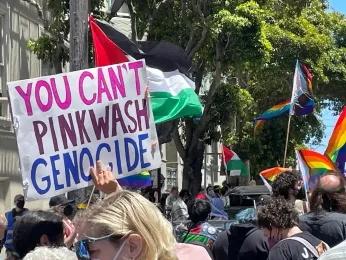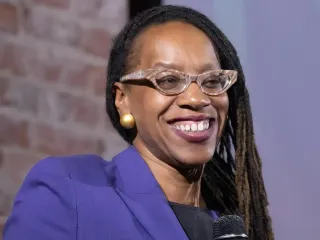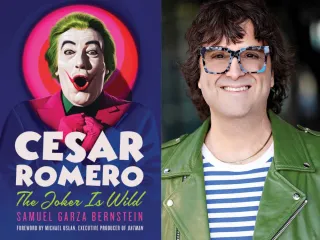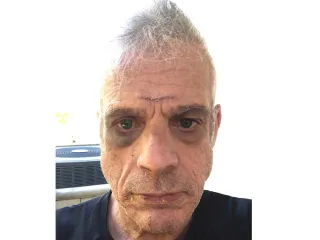
Sep 10
Guest Opinion: Queers must stand up to Israeli pinkwashing
Kate Raphael, Mindy Spatt, and Carla Schick READ TIME: 4 MIN.
Twenty years ago, a poster appeared on BART trains. It pictured a handsome young man cradling an automatic rifle in his lap. “Where in the Middle East Can Gay Officers Serve Their Country?” read the headline above the photo, and the answer below, on a pink background, read “Only in Israel.”
This was an early instance of “pinkwashing,” a term introduced by a Bay Area Arab artist to describe the use of Israel’s LGBTQ-friendly policies to distract from human rights abuses against Palestinians. (“Pinkwashing” was originally coined by Breast Cancer Action in response to disingenuous corporate “pink ribbon” campaigns.) With Israel’s genocide in Gaza drawing headlines and worldwide condemnation, the international queer community has become more and more united against pinkwashing, understanding that its purpose is to divide the advocates of justice.
The “Gay Soldiers” poster was one of a series distributed by BlueStar PR, an agency formed in San Francisco to “build support for Israel among its toughest critics – young liberals in North America and Europe.” This was 2006, and Israel was in the process of invading Lebanon for the third time, killing at least 1,200 Lebanese civilians and leaving close to half a million homeless. At the same time, the international LGBTQ organization InterPride was preparing for World Pride in Jerusalem, an event ironically promoted as “Love Without Borders,” in a city bisected by the Apartheid Wall, which had caused tens of thousands of Palestinians to lose access to land, family, jobs, and school.
Our group, Queers Undermining Israeli Terrorism (QUIT!), called on international queers to boycott World Pride Jerusalem, pointing out the hypocrisy of celebrating queer rights in a city where Palestinian queers could not get through checkpoints to join the march. The Palestinian lesbian group, Aswat, wrote, “As the pride parade will be a time for the gay and lesbian community in Israel to celebrate, Palestinians in Eastern occupied Jerusalem will continue to suffer under intensified checkpoints, increasing racism, house demolishing, confiscating IDs and expanding of Israeli settlements.” Dozens of international queer groups ultimately declined to participate in World Pride.
A few years later, the Israeli government officially launched a “Brand Israel” campaign with a budget of over $3 million to change the way Israel was seen in the world. As part of this campaign, the Israeli Ministry of Tourism and Aguda, the largest Israeli LGBTQ organization, launched “TEL AVIV GAY VIBE,” an online tourism campaign to promote gay travel to Israel in Europe and the U.S. In 2010, the Israeli consul general in San Francisco and the LGBTQ Israel support group A Wider Bridge announced a monthlong festival to showcase LGBTQ art and film.
What was missing from all of this was any mention of Israel’s ongoing occupation of the West Bank and Gaza, repeatedly ruled illegal under international law, and its legal discrimination against Palestinian citizens of Israel, who are mostly disqualified from owning land, excluded from many government jobs, and prevented from commemorating their history. As the Out in Israel festival was being promoted, the Israeli legislature was preparing to pass the Admissions Committee law, which allows communities to screen and reject applicants based on their “social suitability” to the “social and cultural fabric.” This law has been used solely to exclude Palestinians from Jewish-only towns.
The premise of Brand Israel’s LGBTQ focus is that Israel is the only safe place in the Middle East for queers. Indeed, fundamentalist religious regimes in the Middle East are not friendly to queer people. But solidarity with queers in Arab countries means listening to them. Palestinian queers explicitly demand that international queers support their liberation struggle against Israeli colonialism by resisting pinkwashing. As Israel’s campaign of genocide against Palestinians in Gaza has escalated to unheard-of proportions, hundreds of queer organizations from San Francisco to Berlin to Raleigh, North Carolina have held “No Pride in Genocide” actions and demanded their Pride organizations stop partnering with companies and institutions that profit from Israeli war crimes.
In the Bay Area, thousands have joined QUIT! and Gay Shame in Queers of the Plaza demonstrations, marches, and die-ins starting from Harvey Milk Plaza, and in the Dykes for Palestine contingent in the 2025 Dyke March. In 2024, after a 17-year campaign led by QUIT! and SWANABAQ (SouthWest Asian and North African Bay Area Queers), Frameline, producers of the San Francisco International LGBTQ+ Film Festival, agreed not to partner with the Israeli Consulate or its proxies until Israel ends its apartheid and occupation.
Our Bay Area queer communities have always understood that our liberation is bound up with the global struggle for social justice. The queers who came together after Stonewall to form Gay Liberation Front, Bay Area Gay Liberation, and Lesbians Against Police Violence understood queer liberation as inextricably connected to feminism, anti-racism, anti-colonialism, the labor movement, the fight for accessibility, and so much more. In 1991, ACT UP and Queer Nation joined the shutdown of the San Francisco Federal Building to protest the first U.S. war against Iraq.
Palestine cannot be excluded or sectioned off from this call for all liberation. Lesbians in San Francisco held the first known event centering lesbians in Palestine in 1988, during the First Palestinian Intifada. When we say no to pinkwashing, we honor this powerful legacy of struggle. There can be no freedom for any of us without freedom and justice for all of us. Free Palestine.
Kate Raphael, Mindy Spatt, and Carla Schick are all founding members of Queers Undermining Israeli Terrorism (QUIT!).



